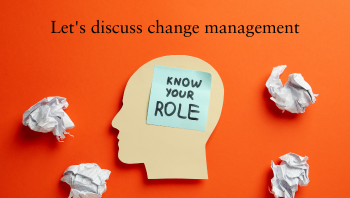Change management and change managers: systemic process designers instead of gardeners in the Shire
The speed and intensity with which companies are facing changes is reminiscent of a tsunami:
- globalization and trade conflicts,
- political and demographic shifts,
- new market requirements,
- changing customer needs and technological disruption
- digitalization and AI
are creating unprecedented pressure to adapt. This force field is pushing companies and the people in them to the limit of their capacity.
Accordingly, organizations today rarely achieve static target states, but rather must be able to continuously adapt to new circumstances. These requirements shift the focus from the classic “one-time project” of change to a “permanent change state” that characterizes the entire company.
New challenges for change management
In this force field, the demands on change management itself are also growing. The following “tectonic movements” affect the professional role and the tasks of the change management team:
1. Economic efficiency, time and cost pressure
- Today, CM must be aligned much more precisely to make a quantifiable contribution to return on investment (ROI) with its own services. “Profitability in change” means establishing a clear link between change projects and corporate strategy and values, as well as hard key figures (productivity, quality, cost reduction, and increased earnings).
- We are experiencing a drastic acceleration of corporate development. Whether internal strategy adjustments, product or process innovations, market entries in new regions or mergers – changes today must be anticipated and implemented almost in real time.
- That is why we need organizational development today that experiments, evaluates and readjusts in short cycles with an iterative and learning approach.
- And at the same time, promoting the company's longer-term strategic change management expertise.
2. Digitalization and innovation
- The digital transformation demands the use of new technologies and also a massive change in processes and working methods in change management itself! internally, must deal intensively with virtual collaboration forms such as #MSTeams or #Slack, AI tools such as #ChatGPT, #DeepSeek, #MSCopilot and countless others, as well as online visualizations such as #MURAL, #Whiteboard or #MIRO, in order to design future-oriented change processes that are effective, fast, participation-oriented and - today more important than ever - scalable.
- At the same time, CM should play an active role in the company's ability to innovate: a deep understanding of global megatrends, of currently dominant technical innovations and upcoming developments is absolutely essential. Change Management should be able to provide new strategically beneficial impulses to the already heavyweight operational perspective in the company.
3. People: mental stress and health in transition
- According to the German Federal Ministry of Health, “around 15 percent of all sick days [...] are due to mental illnesses. Mental illnesses are also particularly explosive due to their duration, which, at an average of 36 days, is three times as high as for other illnesses, at 12 days. All age groups of the working population [...] are affected.”
- It is clear that the overall global situation, the societal loss of confidence (A. @Reckwitz) and the pressure on companies to adapt are having a negative impact on the ability of many people to participate optimistically in the constant restructuring of the company. And it would be important to accept that prevention and the promotion of mental health are becoming increasingly important as part of sustainable organizational development.
- In view of this situation, good organizational development and CM clearly need a strong mandate from senior management to finally give this dimension of emotional acceptance and mental health the appropriate weight in necessary large-scale change processes.
4. Change of perspective: SYSTEM qualification instead of training individual employees
- The topic of change management is often the responsibility of the human resources department. Their knee-jerk reaction is usually to respond to company developments with training programs. While this may be necessary sometimes, it is not enough.
- Instead, it is essential to understand strategy-oriented organizational development as SYSTEM qualification and to practice it as a genuine system competence (and not exclusively as the qualification of individuals) .
- Change Management should comprehend all relevant elements of an organizational and leadership system as that which is to be shaped: Just as the sound waves of an explosion set everything around them in violent vibration, companies and public authorities are also affected in their entirety and depth when there is a significant strategic development.
A proposal: The new self-understanding and the new commissioning of Change Management
To achieve significantly better change competence in companies,
- a new understanding of the role of change management in the organization is needed. It is no longer “only” about gaining acceptance, but CM is a professional design and control process that, at its core, sets the entire company in motion - strategically, structurally, culturally and in terms of personnel.
- A significantly expanded mandate for change management with this system qualification,
- a new self-image of those who are responsible for and practice change management (in the future, CM will clearly be more than just landscape maintenance in the Shire...)
- A “Change Management staff position” equipped for this expanded range of services, just like “Quality Management” or “Agile”... (however this is to be realized in the respective organization: you can find innovative ideas for this in our following blog!).
Consequences for the training of change managers
All these points show that the training curricula for future change managers and the skills provided by such a staff unit need to be significantly expanded.
In addition to the classic project management perspective and (communication) psychological basics, the following are required:
- In-depth strategy expertise
How is a corporate or divisional strategy developed and implemented?
How can market analyses, business models and competitive strategies be classified systemically? - Systemic-cultural competence
To comprehend organizations holistically, a sound background in systemic theories and methods of cultural and behavioral development is needed. If you want to change behavior, you have to change the conditions! - Digitization know-how
Change managers must comprehend the drivers and mechanisms of digital transformation in order to align their own measures accordingly. - Business administration and KPI expertise
This is how change management can better support operational areas in achieving their business goals. It also improves the measurability of change processes. - Knowledge of megatrends and innovation drivers
The entire organization should be able to receive well-founded impulses from megatrend and future research through change management to strengthen its own innovative strength. Further training initiatives in this field are therefore needed in the short term.
Conclusion
The challenges that companies face today require more than just superficial changes. A systematically well-thought-out, emotionally intelligent and structurally anchored change management approach is the key to the sustainable implementation of strategic changes.
This requires:
- Change management as an integral part of corporate strategy and leadership
- A change management staff position with extended competencies or another valid anchoring, e.g. with executives and in processes
- Systemic qualification instead of isolated HR measures
By linking strategy, operational processes and emotional dynamics, change becomes an integral part of corporate development – and could thus save the Shire from the looming shadows....
💬 Join the discussion:
In which direction does change management need to develop to meet these challenges? What role should change managers take on in the future? Share your thoughts with us!


About me

All Rights Reserved
Get in touch
-
+49-(0)941 600 93 003
-
This email address is being protected from spambots. You need JavaScript enabled to view it. -
Thomas_Huber
ToChange Gmbh
-
Thomas Huber
-
Traubengasse 6
-
D-93059 Regensburg

